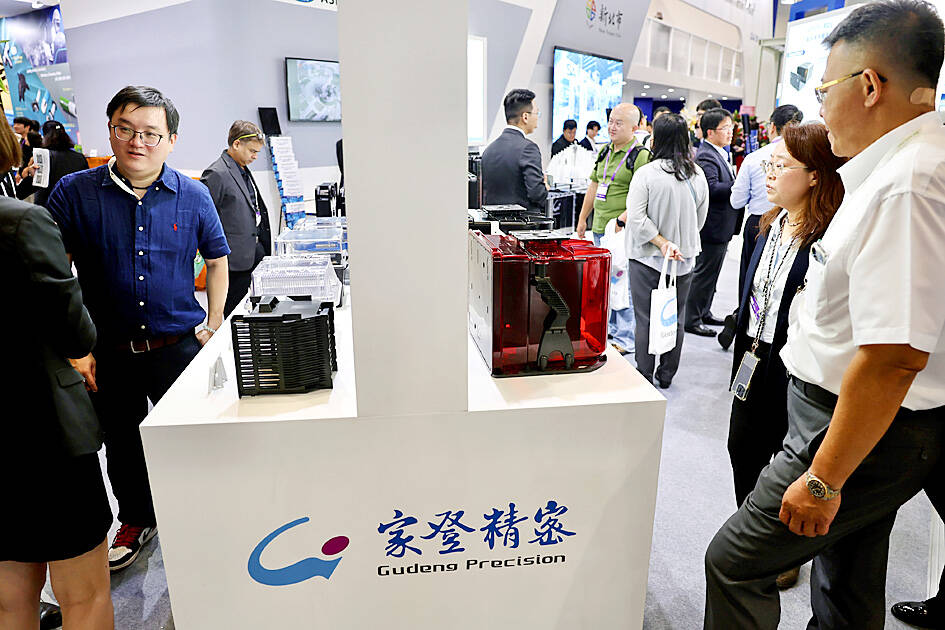Gudeng Precision Industrial Co (家登精密), the sole extreme ultraviolet (EUV) pod supplier to Taiwan Semiconductor Manufacturing Co (TSMC, 台積電), is aiming to expand revenue to NT$10 billion (US$304.8 million) this year, as it expects the artificial intelligence (AI) boom to drive demand for wafer delivery pods and pods used in advanced packaging technology.
That suggests the firm’s revenue could grow as much as 53 percent this year, after it posted a 28.91 percent increase to NT$6.55 billion last year, exceeding its 20 percent growth target.
“We usually set an aggressive target internally to drive further growth. This year, our target is to surpass NT$10 billion,” Gudeng chairman Bill Chiu (邱銘乾) told reporters on the sidelines of the company’s annual year-end party in New Taipei City on Saturday.

Photo: CNA
Revenue growth this year would primarily come from the core wafer pod business, including box-like front-opening unified pods for less advanced wafers and EUV pods, thanks to new factories launched by customers in Taiwan, China and South Korea, Chiu said.
“We have to thank the gentleman wearing the leather jacket [Nvidia Corp chief executive Jensen Huang (黃仁勳)] for creating the demand. AI demand could be enormous when such features become popular on edge devices,” he said.
Reticle boxes and EUV pods made up about 60 percent of Gudeng’s total revenue during the first 11 months of last year, the company said.
TSMC utilizes EUV tools to produce its advanced 5-nanometer, 4-nanometer and 3-nanometer chips.
Wafer pods accounted for 35 percent to 40 percent of the firm’s total revenue over the 11-month period. They are used to transport wafers in the manufacturing process on less advanced technology.
New front-opening unified pods and front-opening shipping pods used in the advanced chip-on-wafer-on-substrate technology, would be another growth driver, Chiu said.
A front-opening shipping pod is used to transfer the wafer from the wafer fabrication unit to the semiconductor manufacturing unit, while a front-opening unified pod stores and moves the wafer from one process to another in a factory.
Those pods have been adopted by TSMC, ASE Technology Holding Co (日月光投控), the world’s largest chip packaging and testing services provider, and a US-based chipmaker, Gudeng said.
The company said its new aviation subsidiary, Jyr Aviation Component Co (朝宇航太科技), would also contribute to this year’s growth in revenue.
The aviation business reported that revenue more than doubled to NT$400 million last year from NT$180 million in 2023.
It has secured deals to supply aircraft landing gear barrels to General Electric Co, Boeing Co and Parker Hannifin Corp.

Vincent Wei led fellow Singaporean farmers around an empty Malaysian plot, laying out plans for a greenhouse and rows of leafy vegetables. What he pitched was not just space for crops, but a lifeline for growers struggling to make ends meet in a city-state with high prices and little vacant land. The future agriculture hub is part of a joint special economic zone launched last year by the two neighbors, expected to cost US$123 million and produce 10,000 tonnes of fresh produce annually. It is attracting Singaporean farmers with promises of cheaper land, labor and energy just over the border.

US actor Matthew McConaughey has filed recordings of his image and voice with US patent authorities to protect them from unauthorized usage by artificial intelligence (AI) platforms, a representative said earlier this week. Several video clips and audio recordings were registered by the commercial arm of the Just Keep Livin’ Foundation, a non-profit created by the Oscar-winning actor and his wife, Camila, according to the US Patent and Trademark Office database. Many artists are increasingly concerned about the uncontrolled use of their image via generative AI since the rollout of ChatGPT and other AI-powered tools. Several US states have adopted

A proposed billionaires’ tax in California has ignited a political uproar in Silicon Valley, with tech titans threatening to leave the state while California Governor Gavin Newsom of the Democratic Party maneuvers to defeat a levy that he fears would lead to an exodus of wealth. A technology mecca, California has more billionaires than any other US state — a few hundred, by some estimates. About half its personal income tax revenue, a financial backbone in the nearly US$350 billion budget, comes from the top 1 percent of earners. A large healthcare union is attempting to place a proposal before

KEEPING UP: The acquisition of a cleanroom in Taiwan would enable Micron to increase production in a market where demand continues to outpace supply, a Micron official said Micron Technology Inc has signed a letter of intent to buy a fabrication site in Taiwan from Powerchip Semiconductor Manufacturing Corp (力積電) for US$1.8 billion to expand its production of memory chips. Micron would take control of the P5 site in Miaoli County’s Tongluo Township (銅鑼) and plans to ramp up DRAM production in phases after the transaction closes in the second quarter, the company said in a statement on Saturday. The acquisition includes an existing 12 inch fab cleanroom of 27,871m2 and would further position Micron to address growing global demand for memory solutions, the company said. Micron expects the transaction to